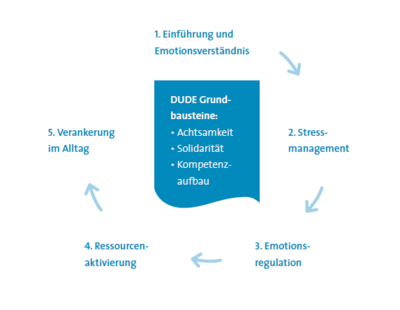DUDE – You and your emotions
A cooperation project between the Department of Child and Adolescent Psychiatry, Psychosomatics and Psychotherapy of the University Hospital of Würzburg and the health insurer Kaufmännische Krankenkasse (KKH), with the aim of improving emotion regulation in adolescents.
DUDE …
- is a school-based prevention program consisting of five 90-minute modules
- is designed for school pupils aged from 11 to 13 years (6th and 7th school grades)
- aims to improve and promote emotion regulation. This should strengthen mental health in the long term and prevent the development of mental illnesses
- is designed to be fun, and uses experience-based and interactive exercises to enable an optimum transfer of knowledge to everyday life
- was developed according to the latest scientific knowledge; is therefore scientifically founded
- is free of charge and can be integrated directly into school lessons
1.8 million children and adolescents in Germany suffer from a mental disorder, and the trend is rising. Common to almost all mental disorders is an impaired ability to regulate feelings. The good news: Regulating one’s feelings can be trained, meaning that the risk of developing a mental illness can be minimized. The Department of Child and Adolescent Psychiatry of the University Hospital of Würzburg wants to put this insight from the latest scientific findings into practice. Therefore, together with the KKH, it is developing the universal prevention program DUDE – You and your emotions.
A main focus of our research group is on non-suicidal self-injury (NSSI), which is often known as self-harm or cutting. Sufferers self-harm in order to reduce negative feelings and the resulting tension through physical pain. Around a third of all adolescents in Germany have self-harmed at some point.
The latest research findings from psychotherapy show that the ability to maintain a balance of one’s own feelings can be trained, consequently preventing NSSI.
NSSI belongs to the so-called maladaptive or dysfunctional strategies. Increased alcohol consumption, drug abuse, aggression, lying or stealing are other examples of strategies which, in the long term, do not bring about any improvement in emotionally charged phases.
Building on this, the Department of Child and Adolescent Psychiatry of the University Hospital of Würzburg is developing the universal prevention program DUDE.
DUDE pursues the goal of improving adolescents’ regulation of feelings, and consequently counteracting the development of NSSI while at the same time stabilizing mental health as a whole.
- The training focuses above all on imparting strategies that help adolescents to be better able to deal with and regulate stress and intense emotions.
- Following the training, participants are better placed to deal with difficult emotional or interpersonal situations. Through this, NSSI (or other long-term damaging behaviors such as drug consumption) can be prevented.
- Additionally, the program promotes participants’ self-esteem and self-efficacy expectations. The social support within the class is improved, and the participants’ general mental health is positively influenced.
DUDE is composed of 5 double lessons, which are provided about one week apart during regular teaching. Each double lesson is based on a different thematic area:
- The program focuses on combining interactive, experience-oriented exercises with elements from mindfulness and dialectical behavior therapy (DBT). In a playful manner, participants acquire important competences for maintaining mental health, and learn how to anchor these into everyday life with the help of short practice exercises at home.
- DUDE follows the approach of covert prevention, in order to guard against mental impairments by building up adaptive strategies and resources.
Our team and the director of studies would like to warmly welcome the following high schools to the DUDE prevention program:
- Friedrich-König-Gymnasium Würzburg
- Armin-Knab-Gymnasium Kitzingen
- Gymnasium Christian-Ernestinum Bayreuth
- Jack-Steinberger-Gymnasium Bad Kissingen
- Franz-Ludwig-Gymnasium Bamberg
- Caspar-Vischer-Gymnasium Kulmbach









